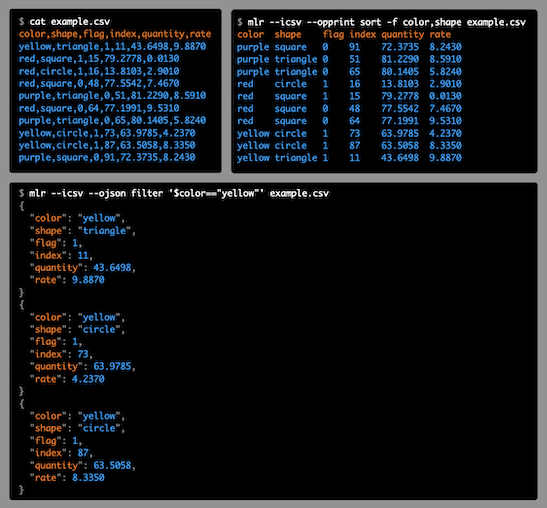Take the 2021 Miller User Survey!
Miller is like awk, sed, cut, join, and sort for data formats such as CSV, TSV, tabular JSON and positionally-indexed.
With Miller, you get to use named fields without needing to count positional indices, using familiar formats such as CSV, TSV, JSON, and positionally-indexed. Then, on the fly, you can add new fields which are functions of existing fields, drop fields, sort, aggregate statistically, pretty-print, and more.
-
Miller operates on key-value-pair data while the familiar Unix tools operate on integer-indexed fields: if the natural data structure for the latter is the array, then Miller's natural data structure is the insertion-ordered hash map.
-
Miller handles a variety of data formats, including but not limited to the familiar CSV, TSV, and JSON. (Miller can handle positionally-indexed data too!)
In the above image (color added for the illustration) you can see how Miller embraces the common themes of key-value-pair data in a variety of data formats.
- A quick tutorial on Miller
- Tools to manipulate CSV files from the Command Line
- www.togaware.com/linux/survivor/CSV_Files.html
- MLR for CSV manipulation
- Miller in 10 minutes
- Linux Magazine: Process structured text files with Miller
- Miller: Command Line CSV File Processing
- Full documentation
- Miller's license is two-clause BSD
- Notes about issue-labeling in the Github repo
- Active issues
- Discussion forum: https://github.com/johnkerl/miller/discussions
- Feature requests / bug reports: https://github.com/johnkerl/miller/issues
Thanks to all the fine people who help make Miller better by contributing commits/PRs! (I wish there were an equally good way to honor all the fine people who contribute through issues and feature requests!)
There's a good chance you can get Miller pre-built for your system:
| OS | Installation command |
|---|---|
| Linux | yum install millerapt-get install miller |
| Mac | brew install millerport install miller |
| Windows | choco install miller |
See also building from source.
-
Miller is multi-purpose: it's useful for data cleaning, data reduction, statistical reporting, devops, system administration, log-file processing, format conversion, and database-query post-processing.
-
You can use Miller to snarf and munge log-file data, including selecting out relevant substreams, then produce CSV format and load that into all-in-memory/data-frame utilities for further statistical and/or graphical processing.
-
Miller complements data-analysis tools such as R, pandas, etc.: you can use Miller to clean and prepare your data. While you can do basic statistics entirely in Miller, its streaming-data feature and single-pass algorithms enable you to reduce very large data sets.
-
Miller complements SQL databases: you can slice, dice, and reformat data on the client side on its way into or out of a database. You can also reap some of the benefits of databases for quick, setup-free one-off tasks when you just need to query some data in disk files in a hurry.
-
Miller also goes beyond the classic Unix tools by stepping fully into our modern, no-SQL world: its essential record-heterogeneity property allows Miller to operate on data where records with different schema (field names) are interleaved.
-
Miller is streaming: most operations need only a single record in memory at a time, rather than ingesting all input before producing any output. For those operations which require deeper retention (
sort,tac,stats1), Miller retains only as much data as needed. This means that whenever functionally possible, you can operate on files which are larger than your system’s available RAM, and you can use Miller in tail -f contexts. -
Miller is pipe-friendly and interoperates with the Unix toolkit
-
Miller's I/O formats include tabular pretty-printing, positionally indexed (Unix-toolkit style), CSV, JSON, and others
-
Miller does conversion between formats
-
Miller's processing is format-aware: e.g. CSV
sortandtackeep header lines first -
Miller has high-throughput performance on par with the Unix toolkit
-
Not unlike
jq(http://stedolan.github.io/jq/) for JSON, Miller is written in portable, modern C, with zero runtime dependencies. You can download or compile a single binary,scpit to a faraway machine, and expect it to work.
Today I discovered Miller—it's like jq but for CSV: https://t.co/pn5Ni241KM
— Adrien Trouillaud (@adrienjt) September 24, 2020
Also, "Miller complements data-analysis tools such as R, pandas, etc.: you can use Miller to clean and prepare your data." @GreatBlueC @nfmcclure
Underappreciated swiss-army command-line chainsaw.
— Dirk Eddelbuettel (@eddelbuettel) February 28, 2017
"Miller is like awk, sed, cut, join, and sort for [...] CSV, TSV, and [...] JSON." https://t.co/TrQqSUK3KK
Miller looks like a great command line tool for working with CSV data. Sed, awk, cut, join all rolled into one: http://t.co/9BBb6VCZ6Y
— Mike Loukides (@mikeloukides) August 16, 2015
Miller is like sed, awk, cut, join, and sort for name-indexed data such as CSV: http://t.co/1zPbfg6B2W - handy tool!
— Ilya Grigorik (@igrigorik) August 22, 2015
Btw, I think Miller is the best CLI tool to deal with CSV. I used to use this when I need to preprocess too big CSVs to load into R (now we have vroom, so such cases might be rare, though...)https://t.co/kUjrSSGJoT
— Hiroaki Yutani (@yutannihilat_en) April 21, 2020
Miller: a *format-aware* data munging tool By @__jo_ker__ to overcome limitations with *line-aware* workshorses like awk, sed et al https://t.co/LCyPkhYvt9
— Donny Daniel (@dnnydnl) September 9, 2018
The project website is a fantastic example of good software documentation!!
Holy holly data swiss army knife batman! How did noone suggest Miller https://t.co/JGQpmRAZLv for solving database cleaning / ETL issues to me before
— James Miller (@japanlawprof) June 12, 2018
Congrats to @__jo_ker__ for amazingly intuitive tool for critical data management tasks!#DataScienceandLaw #ComputationalLaw












